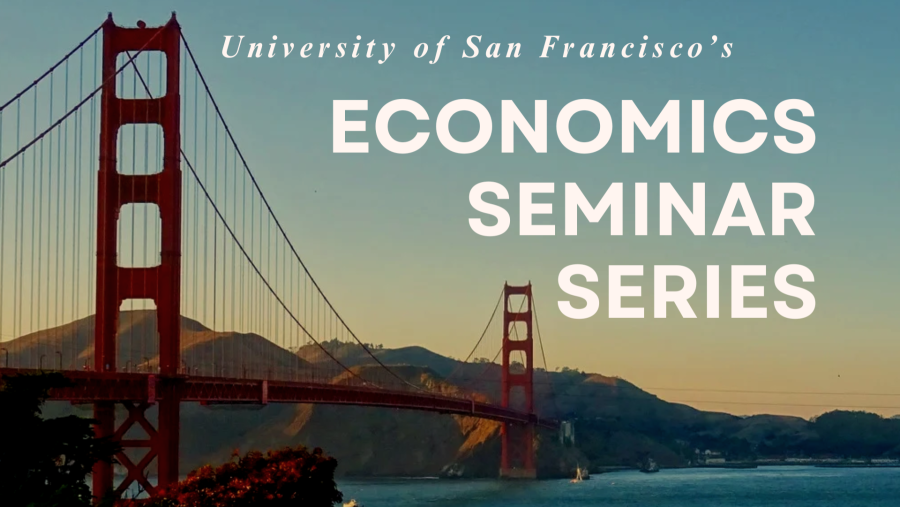Departmental Research Seminar

Curious about the latest industry trends and cutting-edge research in economics? The Economics Seminar Series offers you a front-row seat to the knowledge and experience of industry leaders and experts. Held in both the Fall and the Spring semester, this is an opportunity to deepen your understanding of what’s shaping the field today, while also connecting with fellow students and inspiring professionals.
Join us in person on Thursdays from 3:00 - 4:30pm for these intriguing and relevant seminars. We encourage you to take this opportunity to engage with, and learn from, the best in the field!
Join the Economics Seminar Series Mailing List
Spring 2026 Seminar Schedule:
| DATE | SPEAKER | Position | Institution | Title & description | Location |
|---|---|---|---|---|---|
| January 29th, 2026 | Alexandra Schubert | Post Doctoral Scholar | Center for Effective Global Action; UC Berkeley |
Self-Detrimental Avoidance of Rest Across many cultures, resting instead of working is viewed as a barrier to higher earnings. This belief is also reflected in many canonical economic models. Recent empirical evidence highlighting the productivity benefits of rest challenges this belief. Yet, existing work tends to ignore individuals’ demand for restful activities and whether it aligns with their returns. In the context of an online labor market experiment in South Africa, we explore whether workers capitalize on the returns to short rest periods. After eliciting demand for rest, we estimate returns to rest for the same individuals and find that mandated rest boosts productivity by 0.3 standard deviations, thus making up for forgone earnings from resting. At the same time, only 19% of workers voluntarily choose to rest. Contrary to the notion of selection on returns, workers with high financial returns to rest do not select into rest. We provide suggestive evidence that misperceived financial returns are driving the disconnect between demand for and returns to rest. Our results provide proof-of-concept evidence that individuals may be misallocating effort between resting and working and could reach higher overall utility by working less. This highlights the importance of understanding misperceptions around rest, especially in light of the economic burden of long-term costs of overworking such as burnout. |
Harney 136 |
| February 5th, 2026 | Richard Jin |
PhD Candidate |
UC Berkeley |
College Alumni Networks and Mobility Across Local Labor Markets We quantify the impact of alumni networks on the geographic mobility of job seekers for nearly 1,400 US colleges and universities. We use detailed employment and education information on LinkedIn users to isolate college-educated workers who faced an exogenous job separation in a mass layoff or firm closure. Using a nested logit model of location choice, we compare the migration decisions of job seekers who were displaced in the same city and who attended different but similar and geographically proximate universities. We find that a 1% increase in the number of co-alumni in the city of displacement increases a job seeker’s odds of staying there by 0.4%. Conditional on moving, a 1% increase in a potential destination’s number of co-alumni increases the odds of choosing that city over another by 0.9%. Co-alumni may both impact job search and provide local amenities. Using data on the presence or absence of co-alumni at new jobs, we conclude that the job search channel is particularly important. Co-alumni from the same or neighboring graduating class have much larger impacts on location choice, indicating true network effects rather than idiosyncratic matches between alumni of certain colleges and jobs in certain cities. We also find strong impacts of having more local co-alumni who work in the same industry. |
Harney 136 |
| February 12th, 2026 | Steve Vogel | Professor | UC Berkeley |
Toward an Interdisciplinary Political Economy of Wages This talk will review how some social scientists have transcended disciplinary boundaries in their scholarship on wage formation and propose specific pathways for further trespassing. The speaker contends that an interdisciplinary political economy should connect power to prices. This means that economists should bring power—including political influence and social status—into the heart of their analysis of wage formation, and sociologists and political scientists should extend their analysis of social structure and power dynamics to their endpoint in wage levels. |
Harney 136 |
| February 26th, 2026 | Ted Egan | Chief Economist | City & County of San Francisco | Updates on the SF Bay Area Economy | Harney 136 |
| March 5th, 2026 | Marianna Kudlyak | Economist | Federal Reserve Bank of San Francisco | Harney 136 | |
| April 9th, 2026 | Jamie McCasland | Assistant Professor | University of British Columbia | Harney 136 | |
| April 16th, 2026 | Christian Fons-Rosen | Professor | UC Merced | Harney 136 | |
| April 23rd, 2026 | Remy Beauregard | PhD Candidate | UC Davis | Harney 136 | |
| April 30th, 2026 | Dario Maestripieri | Professor | University of Chicago | Harney 136 |